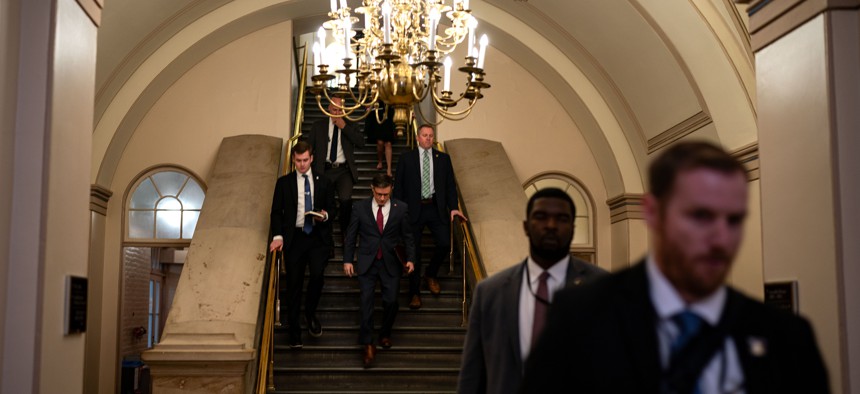House passes spending bills in bipartisan vote

Speaker of the House Mike Johnson arrived for a House Republican conference meeting before a vote on six spending bills. Kent Nishimura via Getty Images
The package of bills provides additional funding for WIC and rental assistance, but drastically cuts funds funds for the largest state and local housing grant program and transit.
Editor’s Note: An earlier version of this story reported that the spending bills would cut the budget for the Biden administration's tech and innovation hubs initiative. That is not the case, it would keep funding for the program the same as last year.
Congress moved toward preventing a partial government shutdown when an overwhelming bipartisan majority in the U.S. House on Wednesday passed a package of six spending bills.
The “minibus” is now headed to the Senate, where it must pass before a midnight deadline on Saturday to keep a number of agencies running, including the housing and transportation departments and the Environmental Protection Agency.
The spending bills passed by a 339-85 vote in the House. The measures would provide additional funding for several programs, most notably for rental assistance and the Special Supplemental Nutrition Program for Women, Infants, and Children, or WIC.
But as part of their agreement in June to avert a default on the nation’s debt, Democrats and Republicans largely kept federal spending roughly the same as last year. The Biden administration’s “regional technology and innovation hubs” initiative, for instance, will receive the same $41 million as in the last fiscal year’s spending package.
Authorized under the $54.2 billion CHIPS and Science Act, the program is an effort to try to spur new research and industrial development around technology in parts of the country that haven’t seen tech sectors boom. A 2019 report found that 90% of the increase in innovation jobs between 2005 and 2017 occurred in only five “superstar” metropolitan areas—Boston, San Diego, San Francisco, San Jose and Seattle.
Negotiators did agree to several funding cuts, though, including slashing $250 million from the HOME Investment Partnership Program, the largest grant program for state and local governments to build affordable housing; shaving off $232 million in funding from the Environmental Protection Agency; and cutting by nearly two-thirds the amount Amtrak would receive to make rail safety improvements.
“After tough, but fair bipartisan negotiations, we produced a strong bill that prioritizes everyday Americans while rightsizing the bureaucracy,” said Rep. Hal Rogers, a Kentucky Republican. “Make no mistake, many agencies with important missions face reductions under this legislation. We believe it's important to reverse the out-of-control growth of the federal government.”
Conservatives, though, are angry the bills do not cut spending as much as they wanted and do not include changes to immigration policy. The deal, for example, would not give Republicans the nearly two-thirds cut they wanted in funding for Amtrak, including slashing money for the Northeast Corridor by 85%.
Had Republicans not agreed to the deal, the budget, under the debt ceiling deal, would have remained exactly the same as last year. That would have meant that “new programs would not receive funding and existing programs could not be plussed-up to account for the costs of inflation,” according to an analysis by the National League of Cities.
“All of this is a shell game,” Texas Rep. Chip Roy, a conservative Republican, said. “Republicans will talk about how they scored major wins. We did no such thing. We didn’t get any of the things we fought for.”
Democrats, though, were pleased. “We are keeping the government open, protecting the people in need and moving our country forward,” said Rep. Rosa DeLauro of Connecticut, the top Democrat on the House Appropriations Committee. “This legislation does not have everything either side may have wanted, but I am pleased that many of the extreme cuts and policies proposed by House Republicans were excluded.”
The bills would provide $1.3 billion to keep the WIC program funded through September, easing the concerns of state and local governments around the country.
“The increase means eligible families would continue to receive the essential nutrition assistance supported by WIC through the current federal fiscal year,” Kody Kinsley, secretary of North Carolina Health and Human Services, said in a statement to Route Fifty. “Without this increase, additional cost-saving measures may be necessary in North Carolina, including the possibility of a waitlist for some participants putting mothers and children at risk of going hungry.”.
Rep. Tom Cole, an Oklahoma Republican, noted that the proposals would also provide substantially more money for the Department of Housing and Urban Development’s tenant-based rental assistance program. Its budget would increase by nearly $5 billion, bringing the total to $32 billion.
“We've maintained the safety net for people in public housing,” he said. “We all know what has happened to the cost of rent and housing. And frankly, we didn't want to put anybody out of their home and we avoided doing that.”
The work, however, is not over for Congress. House and Senate negotiators must reach a deal on another six spending bills that need to be passed by March 22 to prevent a shutdown of several agencies, including the Department of Health and Human Services. Among the issues still on the table is whether Congress will provide funding for the Affordable Connectivity Program, which gives about 23 million low-income households a $30-a-month subsidy to help pay for internet service.
“It took a lot of bipartisan cooperation to reach this agreement on these six appropriations bills. Now, it will take more bipartisan cooperation to finish the job,” Democratic Senate Majority Leader Chuck Schumer said on Wednesday before the House vote.
Kery Murakami is a senior reporter for Route Fifty, covering Congress and federal policy. He can be reached at kmurakami@govexec.com. Follow @Kery_Murakami
NEXT STORY: The brave new world of local government debt management






